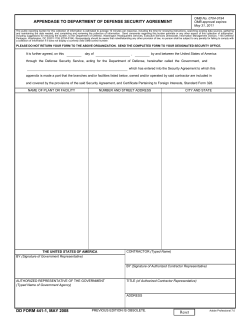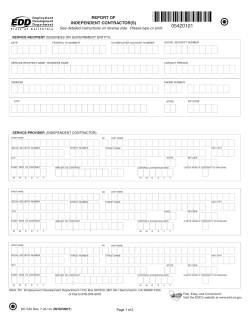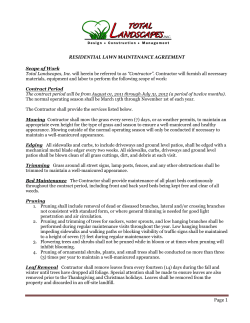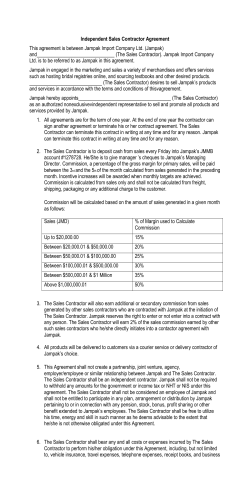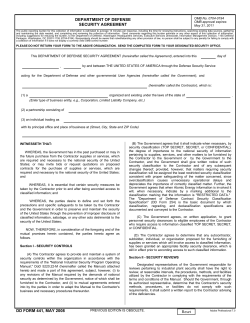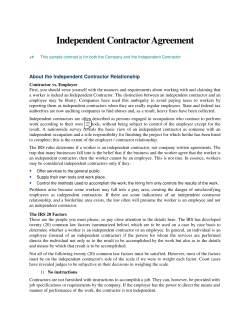
Independent Contractors Top 10 Frequently Asked Questions
Independent Contractors Top 10 Frequently Asked Questions For many individuals, self-employment as an independent contractor can be a rewarding and satisfying career option. As is true with any employment relationship you enter, it’s important to understand the roles and responsibilities of everyone involved. Below are FAQs about independent contractor work to help you gain an understanding of what is involved. Q1. What would my employment status be as an independent contractor? A. There is a fundamental difference between being employed on a full-time regular basis by an employer and engaging in an independent contractor relationship. An employment relationship involves being placed on the employer’s payroll. Employees will be paid either a pre-determined amount (on an hourly or salaried basis), on a commission basis (which means earning income based on a sales-based schedule), or some combination of base pay and commission. All income earned is subject to federal, state, and local taxes, where applicable, and typically, the employer withholds those taxes from the employee’s paycheck. All income earned during the course of a calendar/tax year is reported to the employee and to the federal government by the employer on the form W-2. The employer determines the employee’s work methods and evaluates the employee’s performance. Independent contractors are self-employed. Independent contractors engage in a contracted agreement to provide services to a client in exchange for an agreed upon fee (lump sum, hourly, weekly, monthly, etc.), which may include some form of commission. Independent contractors are not placed on an employer’s payroll; instead, the independent contractor invoices the client for work performed and the client pays the independent contractor through Accounts Payable. The client does not withhold federal, state, and local taxes from the payment, and the independent contractor is responsible for satisfying all tax obligations. All income earned during the course of a calendar/tax year is reported to the independent contractor and to the federal government by the client on form 1099. The independent contractor is responsible to the employer for the end “product” but determines his/her own work methods. Most organizations are careful to distinguish independent contractors from employees. The federal government has adopted common law principles to determine an independent contractor relationship for federal income tax purposes. (Please refer to the checklist at the end, which can be used to assist in determining if someone is an employee or an independent contractor.) You should also be aware that courts in different jurisdictions may apply different tests for making the determination. Q2. Who might I work for as an independent contractor? A. Many businesses, large and small, engage the services of independent contractors. You’ll find that independent contractors work in a wide variety of industries, such as consumer products, transportation, technology, manufacturing, real estate, and so forth. Q3. How will I be paid? A. Reputable organizations typically disclose the terms and conditions of payment through a written compensation agreement. If commission is involved, the agreement should indicate whether the contractor is paid on a commission-only basis, draw vs. commission, or combination of base fee plus commission. The agreement will also describe how and when payment will be made. The terms of each applicable pay structure should be spelled out clearly in writing and agreed to by all parties before work is performed. The agreement should also clearly explain how payment disputes are settled. (Note: Remedies are available to independent contractors should a dispute involving payment for services arise. As independent contractors are self-employed, any dispute involving payment would be resolved either independently or with the help of dispute resolution services, such as collection services, mediation, or arbitration.) As with any agreement, you should seek advice and counsel from a trusted professional before signing and sign only when you fully understand what you are agreeing to. Q4. Are independent contractors eligible for benefits offered by an employer to its employees? A. No. Independent contractors are not eligible for benefits the client makes available to its employees. The independent contractor is self-employed and therefore responsible for his/her own benefits. Q5. Are there risks and responsibilities associated with being an independent contractor rather than an employee? A. Self-employment involves some risks and responsibilities that employees typically don’t assume. For example, the independent contactor assumes all responsibility for tax obligations, handles his/her own benefits, manages billing and collections; maintains appropriate licensing and insurance, and accepts legal responsibilities and exposure associated with performing the job. Q6. Am I protected by the same employment laws as an employee? A. In general, independent contractors are not protected by employment laws since they are self-employed. (The area of employment law is very complicated, and laws vary by state; questions about specific situations should be addressed to legal counsel.) For example, laws that provide for a safe work environment, free from health risks, harassment, or discrimination, protect the rights of employees but may exclude independent contractors. This underscore the critical importance of a written agreement that spells out how the relationship will function, what the expectations are on both sides, and how payment and work performance will be handled. Q7. What kind of investment might I be expected to make? A. Independent contractors who sell the products and/or services of a client will likely be required to first learn everything there is to know about the client’s product and/or services. This may involve an investment by the independent contractor both in time and expense. The time investment may include taking weeks or months to be trained in product knowledge, and this time may be without income. Some positions require independent contractors to purchase goods and/or services, which the contractor then sells to customers. (It is important to understand up front if unsold inventory can be returned after a specific period of time or if the independent contractor assumes the loss. This should be stipulated in the agreement.) The independent contractor may also be expected to incur other related expenses, such as securing licensing, where applicable. Q8. What if a customer is unhappy with the quality of my work or the products or services we are selling? A. The independent contractor is usually accountable for satisfying specific performance expectations, including delivering customer service. Your agreement as an independent contractor should clearly define how you should handle any customer-related complaints (e.g., returning defective products, doing a job over, and so forth.) Q9. What do I do if a client wants me to sign an agreement immediately? A. As with any agreement, if someone doesn’t want to give you adequate time to think it over or consult with others, you should take it as a warning. If it’s really a great deal, it will be available tomorrow. Give yourself at least 24 hours to think about the opportunity in relationship to your career goals and to discuss it with a trusted professional before you sign any documents. Q10. How can I tell if I am an “employee” or an “independent contractor”? Checklist “Employee” or “Independent Contractor” Employee or independent contractor? Below are examples of the questions the courts may review in making a determination. The most important consideration is that of control: Does the employer have the right to control or direct only the result of the work, and not the means and methods of accomplishing the result? If so, it is more likely that the worker will be considered an independent contractor. Thus, the following factors may be considered in determining whether the employer has sufficient control over the worker to result in employment status. Note that there are factors that are common to both “independent contractor” and “employee”; therefore, it is best to look at the relationship as a whole rather than focusing on one or two factors. The bottom line: The more the relationship looks like an employer/employee relationship, where the employer has the right to control the means and methods of accomplishing the desired results, the more likely it is that the courts will view it as such. • • • • • • • • • • • • • • • Is the worker required to follow specific instructions as to the means and manner of performing the work? (Yes=Employee; No=Independent Contractor) Is there a set amount of hours and days that the person must work each week? (Yes=Employee; No=Independent Contractor) Does the employer supply the office, equipment, and tools needed to accomplish the work? (Yes=Employee; No=Independent Contractor) Must the work be performed on the employer’s premises? (Typically, a “yes” answer would indicate the person is an employee; however, there are instances where an independent contractor would be required to perform on the premises. You would need to consider your answer to this question in relation to everything else.) Is the worker trained by the employer to perform the assignments? (Yes=Employee; No=Independent Contractor) Is the assigned work a part of the regular business of the employer? (Yes=Employee; No=Independent Contractor) How long does the relationship continue? (In general, the longer the relationship continues, the more the worker looks like an employee.) Can the employer assign additional projects to the worker? (Yes=Employee; No=Independent Contractor) Is the person paid in the same manner as employees, e.g., biweekly? (Again, typically a “yes” indicates the person is an employee, but there may be instances where the independent contractor is paid in the same or similar manner. Here again you will need to consider this factor in relation to all other factors.) Can the worker hire assistants? (Yes=Independent Contractor; No=Employee) Does the worker provide services to more than one firm? (Yes=Independent Contractor; No=Employee) Does the worker make his or her service available to the general public? (Yes=Independent Contractor; No=Employee) Is there a written contract between the parties delineating their rights and responsibilities? (Yes=Independent Contractor; No=Employee) Can either the worker or the employer terminate the relationship at will? (Yes=Employee; No=Independent Contractor) Is the worker making any investment into facilities or equipment, and will the person realize a profit or risk of loss? (Yes=Independent Contractor; No=Employee) The article was adapted by, the National Association of Colleges and Employment (NACE)
© Copyright 2026
